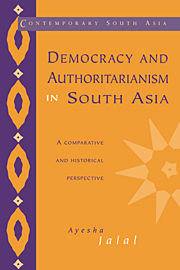Book contents
- Frontmatter
- Contents
- List of maps
- Preface
- Introduction
- 1 The colonial legacy in India and Pakistan
- 2 State formation and political processes in India and Pakistan, 1947 to c.1971
- 3 The ‘populist’ era and its aftermath in India, Pakistan and Bangladesh, 1971 to c.1993
- 4 The state and political economy, 1947 to c.1993
- 5 Central power and regional dissidence
- 6 Societies, cultures and ideologies: hybrids in contrived monoliths
- 7 Conclusion
- Bibliographical essay
- Index
4 - The state and political economy, 1947 to c.1993
Published online by Cambridge University Press: 26 October 2009
- Frontmatter
- Contents
- List of maps
- Preface
- Introduction
- 1 The colonial legacy in India and Pakistan
- 2 State formation and political processes in India and Pakistan, 1947 to c.1971
- 3 The ‘populist’ era and its aftermath in India, Pakistan and Bangladesh, 1971 to c.1993
- 4 The state and political economy, 1947 to c.1993
- 5 Central power and regional dissidence
- 6 Societies, cultures and ideologies: hybrids in contrived monoliths
- 7 Conclusion
- Bibliographical essay
- Index
Summary
The study so far has alluded to the ways in which the state and economy influence social dynamics underlying political processes in India, Pakistan and Bangladesh. Exploring this relationship further and making the implicit more explicit is the task to which this chapter now turns. Instead of looking at economic factors to the exclusion of the political, the analysis merges the two in a broad approximation of the approach adopted by the practitioners of political economy. The concept of political economy, located as it is at the interstices of state and economy, assists analyses of social structures and political processes on economic policy choices which for their part seek to mould the patterns of social change. A focus on the political economies in each of the three countries lends an added dimension to the comparative assessments based on an examination of the unfolding dialectic between state structures and political processes.
Since the end of the second world war, most states in the post-colonial world have laid emphasis on planning for development. The experience of the great depression and the war had underscored the merits of state interventions in the economy. With the onset of decolonization the state's role in development processes came to pervade the theory and practice of development economics. Development was to be overseen by the centralizing state which was considered to be the ultimate leveller of inequities and injustices and, by extension, the myriad diversities rooted in developing societies.
- Type
- Chapter
- Information
- Democracy and Authoritarianism in South AsiaA Comparative and Historical Perspective, pp. 122 - 156Publisher: Cambridge University PressPrint publication year: 1995

